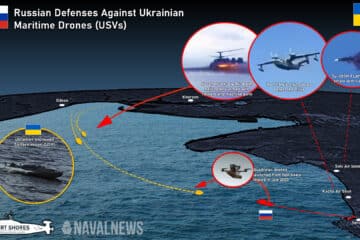The attack took place around 07.45 local time on 24 March. According to several OSINT reports, Russia’s Alligator class landing ship, probably Orsk, was hit with a tactical ballistic missile (possibly OTR-21 Tochka). The strike caused a significant explosion onboard the ship.
After the explosion, the other landing ships in the port (Ropucha-II class landing ships Tsesar Kunikov and Novocherkassk), quickly left the port.
The total number of Russian casualties remains unclear because the ship’s cargo is unknown. There is no visual confirmation of the ship’s cargo during the explosion, whether vehicles and marines were onboard. But it is clear that the Alligator-class landing ship was clearly neutralized.
Earlier this week, the Russian state news agency TASS had called the arrival of the landing craft an “epic event” that “opens up new possibilities for the Black Sea in terms of logistics,” citing the Russian Defence Ministry-affiliated television station Zvezda. TASS reported the vessel could carry up to 1,500 tonnes of cargo, and used for logistic support.
Author’s opinion
Without any doubt, this was the most significant loss of the Russian Armed Forces since the beginning of the war. Because, Russia can replace other casualties (aircraft, tanks, armored vehicles etc.), but cannot replace a landing ship, and cannot reinforce its amphibious forces because Turkey closed the straits for the military ships under the Montreux Convention.
The aging Alligator-class landing ships are the weakest link in the Russian amphibious forces, yet it is important because the Black Sea Fleet lacks modern landing ships. In addition, this ship has reportedly been deployed to provide logistical support, which is essential for Russian forces to maintain their combat power in the region. Russia’s logistics chain has been less than stellar, and any loss is significant in this context.

Another important aspect of the attack is psychological. No matter what type it is, losing a warship makes a major impact on the psychological status of both sides negatively or positively. This event will surely affect the Ukrainian soldiers’ will to fight in a positive way.
Moreover, such an effective attack would cause anxiety in the Russian decision-makers and change that attitude to keep their ships either in Sevastopol Naval Base or at sea rather than deploying them to the captured ports. Because, landing ships (either in the logistical or amphibious role) are “high-value units” due to their force projection capabilities but limited defensive weapons, so they must be protected.
Since Ukraine lacks anti-ship missiles, it is unable to attack Russian warships when they are at sea. It was Ukraine’s only chance to neutralize these ships while they are in port, so these ships are somewhat vulnerable to asymmetric attack while they are discharging their cargo. The Tochka missile has no guidance, so it cannot hit a moving ship at sea. Ukraine seems to have taken the rare opportunity to destroy the Russian ship.






